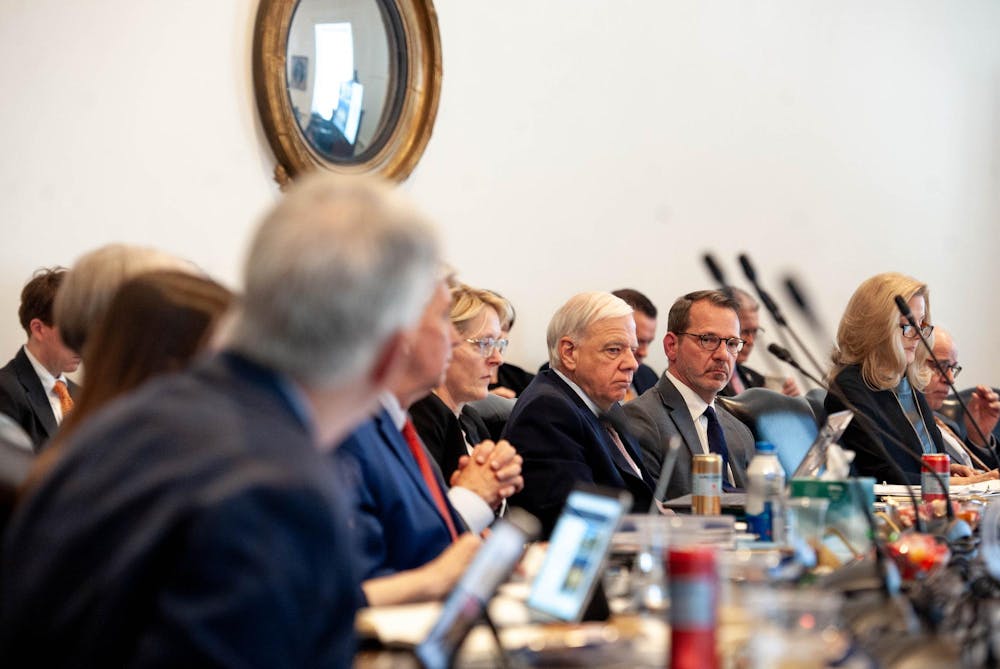As we return to the University, some see a change brewing. No, not your new class schedule or excitement for a better football record this year — rather, some see the fundamental nature of our Board of Visitors changing. In June, Gov. Glenn Youngkin appointed five new members to the Board, cementing a majority of his own selection. Many have assailed past and present appointees to our University as excessively conservative in their educational views and too tied to the MAGA movement, arguing that these political affiliations should be justification enough to reject their appointments. But this approach to Board appointees is short-sighted. In order to protect the fair process of Board selections and preserve its broader responsibility, individuals within the University community should instead prioritize the appointee’s connection to our University as the primary qualification for membership on the Board.
In Virginia, governing board appointees at universities across the state are selected by the Governor and then confirmed by the General Assembly, a process comparable to that of United States Supreme Court justices. The apolitical process of Board appointments, like that of the Supreme Court, can strengthen the legitimacy of the institution because it better reflects the collective views of Virginia voters and Board stakeholders. When the Governor and General Assembly are elected by the people, they are empowered to make decisions for the people. By being a reflection of voters’ trust in their representatives, therefore, the political process of appointments we use is the best way of keeping a legitimate board.
Since this process allows for voters’ voices and opinions to influence Board appointments, the standard for qualification ought to represent something other than solely hewing to one’s own political opinions. As an institution responsible to University students and Virginia voters, the main qualification standard for Board appointment ought to be some personal connection to both of these stakeholders — not blind support for one subjective political side or the other, but a metric which reflects the politically diverse population Board members serve.
Some may believe we should change our appointment processes to reflect the growing politicization of education. The logical — albeit dangerous — extension of this position is that members of the Board should be elected directly. To be fair, school board elections offer a compelling comparison for these advocates to point to. Most Virginia residents get to directly elect the school board members who serve in their school districts.
But this comparison fails to consider the size of the potential voter base for state university governing boards, as well as the frequency of appointments. There were 69 Board appointments in June alone — that is the equivalent of having 69 statewide senate elections in one month. The impracticality of having a statewide referendum on each and every representative makes the existing political process the best pathway to the most representative body.
Despite the Board appointee process reflecting the implicit trust and consent given to our elected representatives, some have called to block candidates for appointment due to differences in educational and political opinions. The 2022 appointment of Bert Ellis, for example, engendered great debate, with many at the University calling for his nomination to be rejected because of his political views. However, as a double alum of the University, a major University donor and the co-owner of a University hang-out spot, Ellis has proven himself to be intimately connected to the University — thus displaying one of the most essential qualifications to serve on its Board.
Some have also argued that the Board at our University should be student-confirmed. But with the powerful presence of the Student Council, Honor Committee and University Judiciary Committee as a triumvirate of self-governance, student confirmation of our Board simply goes too far. Students are neither the only group with a rightful stake in a public institution nor the only ones eminently qualified to judge the Board — because the University is a public corporation funded in part by state dollars and serving as a vehicle largely for in-state students, Virginians at large have a stake in the Board as well as the University community. Consequently, student confirmation alone would disenfranchise other stakeholders from having power towards the Board. Instead, less extreme reforms, such as allowing the student member of the Board a vote, can be instituted to ensure student participation.
Many of our sacred institutions, like the United States Supreme Court, have suffered losses in support as they have fallen prey to hyper-politicization. The Board of Visitors is an essential part of our University, one that has existed for more than 200 years. Its importance must not be threatened by differences in political opinion — or else it will cease to have the mandate it needs and will devolve into yet another illegitimized, hyper-politicized system. It is through this legitimized permanence of the Board that we can continue to evolve as an institution — and hopefully as a football team.
Wylie Brunman is a senior associate opinion editor who writes about politics for The Cavalier Daily. He can be reached at opinion@cavalierdaily.com.
The opinions expressed in this column are not necessarily those of The Cavalier Daily. Columns represent the views of the author alone.







